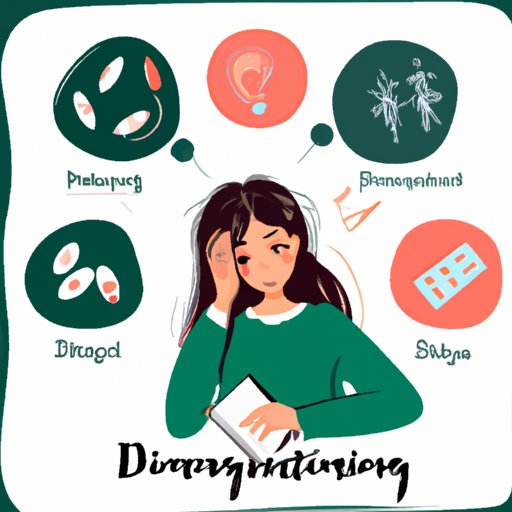I. Introduction
Autoimmune diseases are a growing concern for many people. These conditions occur when the immune system malfunctions and attacks healthy cells. In this article, we provide a comprehensive guide to understanding, living with, and preventing autoimmune diseases. We discuss the science behind autoimmunity, the impact of these diseases on patients’ lives, common autoimmune diseases, and their symptoms, causes, and treatments. We also offer tips for managing mental health and living a healthy lifestyle to prevent autoimmune diseases, as well as information specific to women’s health.
II. Understanding Autoimmune Diseases: An Introductory Guide
Autoimmunity occurs when the immune system, which is designed to fight off foreign invaders like viruses and bacteria, mistakenly attacks healthy cells in the body. This can lead to a variety of autoimmune diseases, including lupus, rheumatoid arthritis, and multiple sclerosis. When the immune system attacks the body, it causes inflammation and damage to tissues and organs. This can lead to a range of symptoms, including fatigue, joint pain, and organ damage.
The immune system is complex and involves many different types of cells and proteins. When the body is healthy, the immune system is able to distinguish between self and non-self, attacking only foreign invaders. In autoimmune diseases, the immune system is unable to differentiate between self and non-self, leading to an attack on healthy cells.
III. The Science behind Autoimmunity: A Comprehensive Explanation
The causes of autoimmune diseases are not fully understood, but experts believe that a combination of genetic and environmental factors can contribute to their development. Genetic factors may make some people more susceptible to autoimmune diseases, while environmental factors such as infections, toxins, and stress may trigger the onset of these conditions.
There are many different types of autoimmune diseases, each with its own set of symptoms and treatment options. Some common autoimmune diseases include lupus, rheumatoid arthritis, celiac disease, and type 1 diabetes. Current research is focused on understanding the underlying mechanisms of autoimmunity and developing new treatments for these conditions.
IV. Living with Autoimmune Diseases: A Patient’s Perspective
Autoimmune diseases can have a significant impact on patients’ lives. Symptoms can be debilitating and can interfere with daily activities. Patients may also experience depression and anxiety as a result of living with a chronic illness. It can be challenging to manage the different aspects of the disease, including medication management, doctor appointments, and lifestyle changes.
However, there is hope for those living with autoimmune diseases. Many patients are able to lead fulfilling lives with the help of medication, supportive care, and lifestyle changes. It is important for patients to advocate for themselves and to seek out the support they need to manage their conditions.
V. Common Autoimmune Diseases: Symptoms, Causes, and Treatments
There are many different types of autoimmune diseases, each with its own set of symptoms, causes, and treatments. Lupus, for example, is a autoimmune disease that can affect multiple organs in the body, including the skin, joints, and kidneys. Symptoms may include fatigue, joint pain, and rashes. Treatment for lupus may include medication and lifestyle changes.
Rheumatoid arthritis is another common autoimmune disease that affects the joints. Symptoms may include joint pain and stiffness, fatigue, and fever. Treatment for rheumatoid arthritis may include medications, physical therapy, and surgery in severe cases.
Celiac disease is an autoimmune disease that affects the digestive system. Symptoms may include abdominal pain, diarrhea, and weight loss. Treatment for celiac disease involves avoiding gluten, a protein found in wheat, barley, and rye.
VI. The Intersection between Autoimmunity and Mental Health
Autoimmune diseases can have a significant impact on mental health. Chronic illness can be stressful and may lead to depression and anxiety. In addition, inflammation, which is a hallmark of autoimmune diseases, has been linked to mental health conditions such as depression and anxiety.
Managing mental health is an important aspect of living with an autoimmune disease. Patients may benefit from counseling, support groups, and stress-reducing activities such as exercise and meditation.
VII. Preventing Autoimmune Diseases: Lifestyle Changes to Boost Your Immunity
While there is no surefire way to prevent autoimmune diseases, there are lifestyle changes that can help boost the immune system and reduce the risk of developing these conditions. Eating a healthy diet, getting enough sleep, exercising regularly, and reducing stress can all have a positive impact on the immune system.
It is also important to avoid exposure to toxins and other environmental factors that may trigger the onset of autoimmune diseases.
VIII. Autoimmune Diseases and Women’s Health: What You Need to Know
Autoimmune diseases are more common in women than in men. Hormonal factors may play a role in the development of these conditions, as well as genetic and environmental factors.
Women with autoimmune diseases may face unique challenges, particularly during pregnancy. It is important for women with autoimmune diseases to work closely with their doctors to manage their conditions and to ensure a healthy pregnancy.
IX. Conclusion
Autoimmune diseases are complex conditions that can have a significant impact on patients’ lives. However, with the right support and treatment, many patients are able to lead fulfilling lives. It is important for patients to educate themselves about their conditions and to seek out the support they need to manage their symptoms.
For more information and resources on autoimmune diseases, visit the websites of organizations such as the American Autoimmune Related Diseases Association and the National Institute of Allergy and Infectious Diseases.
